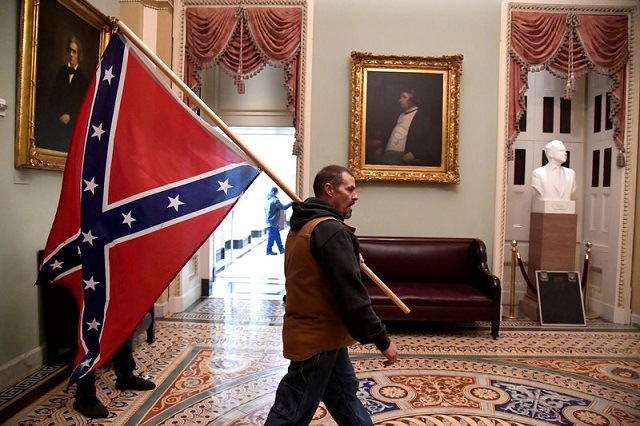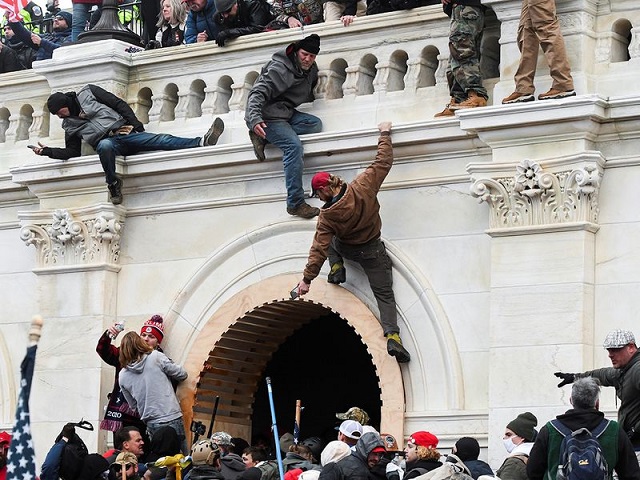“We will never concede”: The Capitol Hill riot did not come out of nowhere Politics
New in Ceasefire, Politics - Posted on Friday, January 8, 2021 12:37 - 0 Comments

(Credit: Reuters)
Wednesday was supposed to be a day of relative celebration in the United States. Democrats took control of the Senate with a pair of significant victories in Georgia’s runoff elections, which secured slender majorities in both chambers of Congress for President-elect Joe Biden and delivered an emphatic rebuke to Trump in the final days of his presidency.
It will still go down as a historically noteworthy day, albeit for more disturbing reasons, after the presidential handover spiralled into chaos as an angry horde of Trump supporters stormed the US Capitol.
The mob had quickly overrun a seemingly powerless police force. They invaded the Senate chamber, with some brandishing guns, as Democrat and Republican lawmakers scrambled to hide under their desks and in offices.
After breaching the barriers, Trump supporters could be seen roaming the building, waving confederate flags and fiercely clashing with security. One even posted pictures from the House speaker Nancy Pelosi’s office where her abandoned laptop appeared to still be on.
The national guard was called in to help secure the Capitol. Shots were fired, leading to several injuries and one fatality. An explosive device was also said to have been found.
The escalation of violence came just moments after Trump held a rally at the White House where he was revving up supporters, insisting ‘we will never give up, we will never concede’. He urged the crowd to march on the Capitol, even telling them ‘I’ll be with you’.
Such divisive and disruptive rhetoric had always been a mainstay of Trump’s presidency and it is precisely what has emboldened the thugs who breached Capitol Hill.
In his book, ‘Populism: A Very Short Introduction’, Cas Mudde identifies key traits associated with populist leaders. The fundamental aspect is the appeal to ‘the pure people’ v ‘the corrupt elite’ — the idea that society is separated into two groups of people, with opponents portrayed as self-serving and undemocratic.
One of the many recurring features of the Trump years has been his knack for converting every issue or experience into an us-versus-them matter. Whether it was anti-racism gestures by American football players, and his encouragement of fans to leave stadiums if they saw players taking the knee, or his designating of Black Lives Matter protestors as ‘thugs’ and ‘anarchists’, Trump has always shown real zest for identifying symbols that engender cultural divisions and prompt feelings of enmity towards certain individuals and groups.
This has particularly intensified in the last few weeks following his loss in the November presidential election. When Utah’s Republican senator Mitt Romney refused to back Trump’s efforts to overturn the results based on unsubstantiated claims of nationwide voter fraud and election rigging, Trump dismissed Romney as a ‘RINO’ — ‘Republican in Name Only’. For Trump supporters, this signalled confirmation that Romney qualified as an enemy of ‘the people’. As a result, he was harassed by Trump supporters at the airport and on his flight into DC on Wednesday. “Let him know what we think!” one woman shouted, before others began chanting, “Traitor!”
“Resign, Mitt!” the woman said as the chants continued.
Martin Bull, Director of the European Consortium of Political Research (ECPR), alluded to another major feature of populist leaders: their dislike of ‘complicated democratic systems’. Trump is unmistakably an embodiment of that. ‘Fake news’, the unrelenting rallying cry Trump turned into a cornerstone of his campaign, has slowly eroded the media’s legitimacy in the eyes of vast swathes of American voters. The result is that the mainstream media, generally considered an indispensable component of any democratic system, is now distrusted by 60% of Americans. Indeed, over half of all Americans believe that media groups concealed or underplayed family scandals to actively help the Biden campaign.

(credit: agencies)
Similarly, in 2016 the slogan ‘DRAIN THE SWAMP’ quickly became one of Trump’s fundamental campaign pledges, as he promised to completely disrupt the culture of Washington DC. That lay the groundwork for a belief among Trump’s core base that the political apparatus in the US is unfit for purpose. The unyielding spreading of misinformation by Trump since the election only cemented that belief. “The fact is we won the presidential election, we won it big”, Trump told a rally only days ago. “The Democrats are trying to steal the White House”, he insisted. It is therefore of little surprise that 75% of Republicans and 40% of the country do not trust the 2020 election results.
Trump’s rhetoric and his methodology since he entered the political landscape has been a lesson in how to implement the aggressive right-wing playbook. All of his measures have perpetuated the perception among his supporters of a never-ending crisis compounded by an establishment working with an unbalanced agenda. Thus when the US Congress was on the verge of certifying Biden’s victory, clearing the path for him to be sworn in on January 20th, Trump supporters saw this as confirmation of the illegitimate, agenda-driven political arrangement in Washington.
Britain should observe the developments across the Atlantic with caution. An insurrection and breach of Parliament may be unlikely, but the politics of division that found a comfortable home in the US also reside in the UK.
Indeed, Brexit, a process made possible by populist slogans like ‘Take back control’ and an election won on the sole promise to ‘Get Brexit done’, have sown deep discord in the country. The us-versus-them emotive discourse was often employed, perhaps best illustrated by the Daily Mail’s ‘enemies of the people’ headline in 2018, featuring pictures of the three judges who ruled that Parliament must be consulted before Article 50 could be triggered.
Prime Minister Boris Johnson, labelled by Trump himself as ‘Britain Trump’, is no stranger to the populist modus operandi of dismissing events that do not go his way. Anticipating parliament’s desire to prevent a no-deal Brexit and with the October 31st deadline looming, Johnson suspended parliament in September 2019. When this was deemed to be unlawful by the Supreme Court, Johnson said he ‘profoundly disagreed’ with the ruling.
Right wing aggressive populism made a historic breach into Capitol Hill possible. It should worry us that this brand of politics is, albeit to a lesser degree, palpable in Britain too.
See Also: Analysis | Burning Down the House: The Danger of Normalising Trump’s Fascism


Leave a Reply